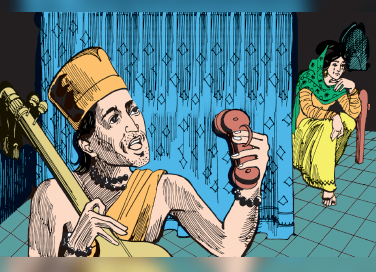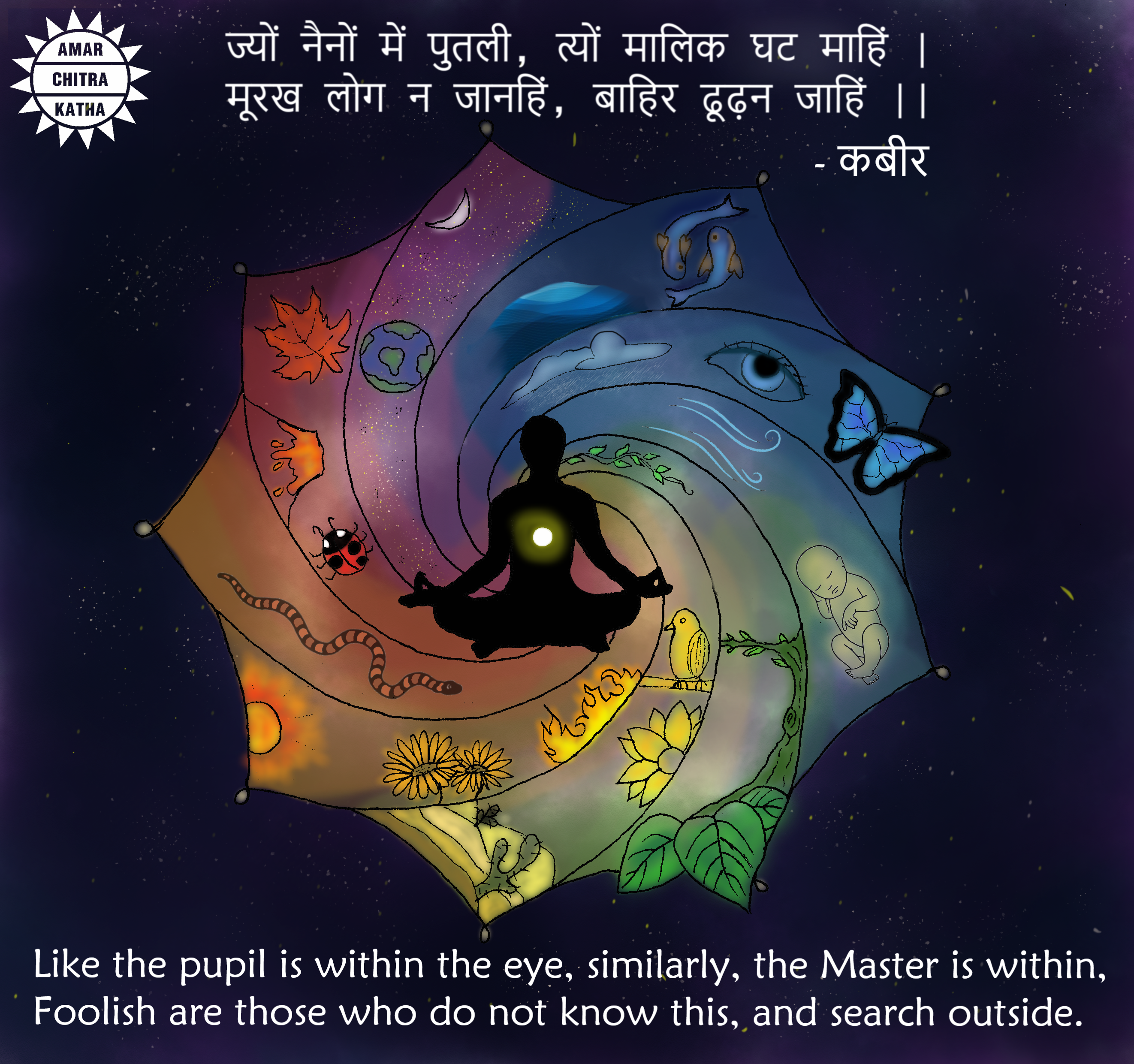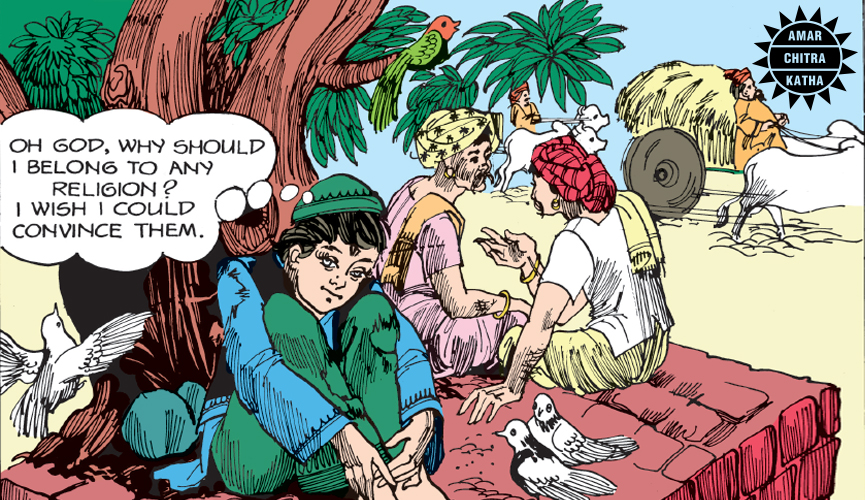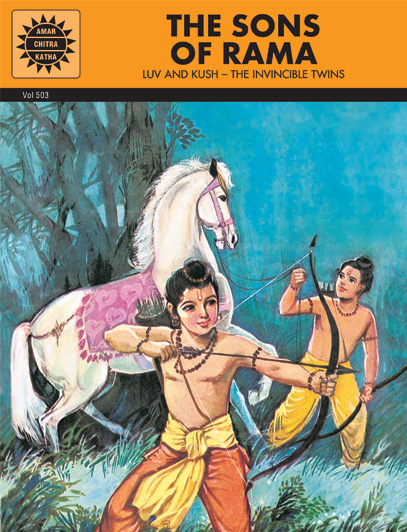Profile: Kabir
- May 14, 2021


Profile: Kabir
- May 14, 2021
By Vijita Mukherjee
Jyon naino me putli
Tyon malik ghat mahin
To receive more such stories in your Inbox & WhatsApp, Please share your Email and Mobile number.
Moorakh log na janhin
Bahar dhundan jahin
– Kabir

Simple language garbing a complex thought process; that is the essence of the poetry of Kabir Das. He used the language of the common man and examples from an ordinary life and spoke that extraordinary truth, which is beyond the grasp of many a learned scholar and philosophical tomes.
Born in 1398, Kabir’s parentage is unknown and hotly debated. He was brought up by a weaver named Niru and his wife Nima in Varanasi. They practised Islam. His spiritual teacher was Swami Ramanand, a Hindu. However, his own religion was one that he discovered within himself. He followed a path illuminated by his own experience, which was a far cry from the dogmas and doctrines of any of the faiths around him. He married a hermit’s daughter named Loi, but was not really interested in the affairs of the world. The religious leaders of all the faiths around him found his unconformity threatening. However, Kabir was unconcerned with their views and distilled his inner growth into a treasure of poetry.

Coming from an economically humble background, Kabir was unlettered and had no opportunity to study any of the scriptures. Yet, his poems are filled with a deep meaning and spirituality that is hard to find elsewhere. His ‘koi bole Ram Ram, koi Khudai…’ reflects his belief in the oneness of the Godhead. This thread of oneness forms the bedrock of Kabir’s literary and philosophical work.
In some other verses, he urges people to follow the path of righteousness and maintain a purity of heart and mind. Devotion, unshackled by the fetters of caste, colour, creed, rituals and religion is the dominant aspect of Kabir’s philosophy and reflected in his poetry. He talks about a formless God, who can be attained only by inward reflection, devotion and love.
His work exists in three major regional variants namely the Eastern (the Bijak), Rajasthani (Kabir – Granthavali) and Punjabi and Hindi (contained in the Adi Granth of the Sikhs). The language he used is a mixed dialect also known as the ‘khadi boli’. His poems are not adorned with any literary embellishments, they spring from the earth he was connected to and are simple and straightforward.
Kabir is famous for his ‘dohas’, which are still popular among the common people and are very lyrical. He also wrote ‘padas’, which are short rhymed poems. The shlokas or ‘sakhis’ that he wrote are a part of the Granth collection. They are terse utterances that are the ‘witnesses’ to the ultimate truth. He mixed Hindu and Muslim references to convey his belief in the oneness of God. He openly spoke about the weaknesses of both Hinduism as well as Islam.
This mystic poet is studied by scholars of poetry as well as philosophy. He is probably one of the most iconic figures of the Bhakti and Sufi movements in 15th century India, which stood for a coming together of all humans in a surge of devotion towards God.
The followers of Kabir’s philosophy are called Kabir Panthis. Many of them write poetry along the same lines as Kabir. However, Kabir himself encouraged people to explore and learn for themselves.
Kabira kabira kya kare, socho aap sharir
Pancho indriya vash kare, so hoy das Kabir.
Why are you quoting Kabir, think for yourself
Control your five senses and then you can be Kabir.
Kabir’s poems have been translated by many scholars both in India and abroad. Rabindranath Tagore too translated and made available these verses in his ‘One Hundred Poems of Kabir’. This mystic poet is said to have passed away around 1518. His death, too, is shrouded in mystery. It is said that his body turned into a heap of flowers, half of which was claimed by the Hindus and half by the Muslims. Kabir’s poetry remains as relevant today as it was so many years ago.
Read the complete story of Kabir on the ACK Comics App. Our title Kabir is also available on Amazon, Kindle, Flipkart, and other major e-tailers.
To receive more such stories in your Inbox & WhatsApp, Please share your Email and Mobile number.

Comic of The Month
The Sons of Rama
The story of Rama and Sita was first set down by the sage Valmiki in his epic poem 'Ramayana.' Rama was the eldest son of Dasharatha, the king of Ayodhya, who had three wives - Kaushalya, Kaikeyi and Sumitra. Rama was the son of Kaushalya, Bharata of Kaikeyi and Laxmana and Shatrughna of Sumitra. The four princes grew up to be brave and valiant. Rama won the hand of Sita, the daughter of King Janaka. Dasharatha wanted to crown Rama as the king but Kaikeyi objected. Using boons granted to her by Dasharatha earlier, she had Rama banished to the forest. Sita and Laxmana decided to follow Rama. While in the forest, a Rakshasi, Shoorpanakha, accosted Laxmana but had her nose cut off by him. In revenge, her brother Ravana, king of Lanka, carried Sita away. Rama and Laxmana set out to look for her and with the help of an army of monkeys, defeated Ravana. On returning Ayodhya after fourteen years of exile, Rama banished Sita because of the suspicions of his subjects. In the ashrama of sage Valmiki, she gave birth to her twin sons, Luv and Kush.